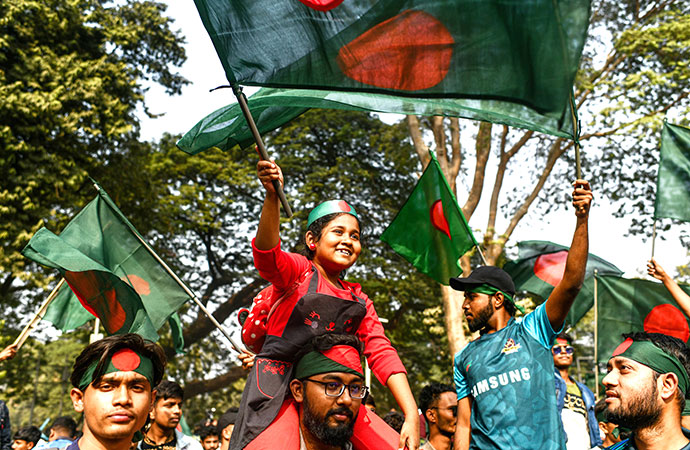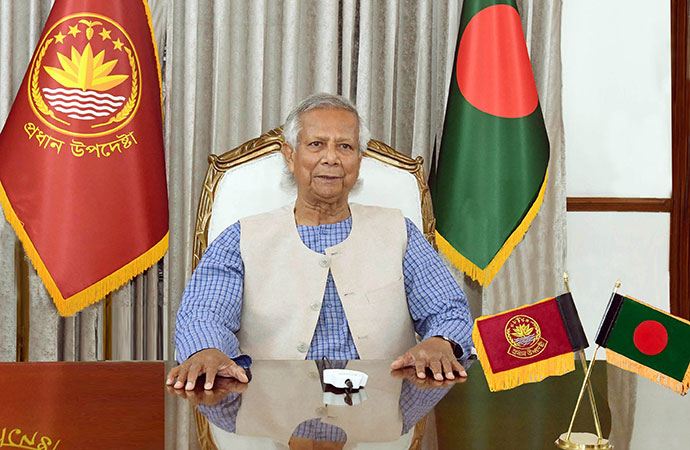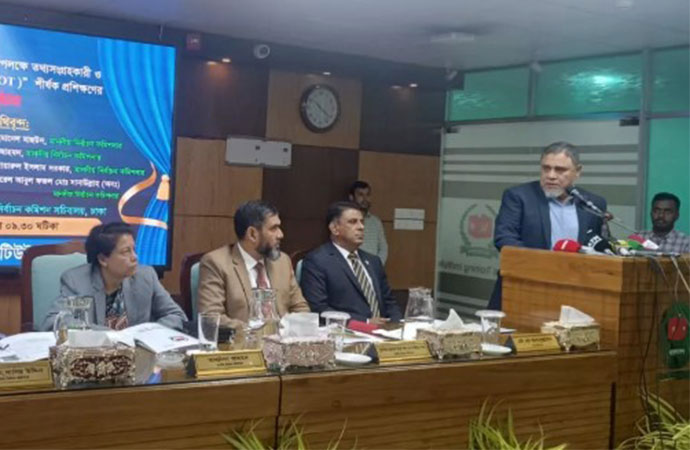Reportage

Photo; UNB
The July Uprising of 2024, that actually reached its zenith five days into August, memorably christened the 36th of July, is likely to remain the most significant political earthquake that the post-1971 or post-liberation generations of Bangladeshis will get to experience in their lifetimes. Those who participated on the frontlines will never forget it. It was clear pretty early on, that except for the ruling Awami League and its most ardent allies, almost all other segments of society threw their support at least, behind this movement, that wasn't led from the front by any politician.
The central coordinators who the nation came to know and trust and love, earned every ounce of all three. What was most remarkable about these young men and women, was how they rose to the standard we set or expectations we had, each time. We must acknowledge the participation of the political parties, mainly the two parties that suffered most during the AL era, namely the BNP and Jamaat e Islami (JI). This was nothing covert or unexpected. Opposition parties can be expected to throw their lot behind any movement against a government, particularly one that they anyway regarded as illegal, for having seized power through elections that lacked credibility, even in the eyes of neutrals.
Although it started out as a movement advocating quota reforms for public sector jobs, where an unfeasible 56% of jobs became reserved under different quotas. Even mathematically, this had become untenable. The lion's share, consisting of 30% or more than half the reserved quota, was earmarked for freedom fighters and their descendants. An earlier AL government extended it to their children, and then after AL returned to power again following the 2008 election, it was extended to their grandchildren. The net result of these moves was the complete politicisation, or to be more specific, Awamification, of public sector jobs.
Even now, a point often raised by the vanquished forces or their supporters and apologists, is that the High Court on July 21 gave a verdict that perfectly matched the students' demands re what quotas should remain and what should be abolished. The question they're usually getting at, is why the students had to continue their protest, even after all their demands were met?
It is a fundamental point of difference between the old guard and the new. While the question may seem to come naturally to those who were toppled and forced to flee, and still today remain uncertain on whether they can return to the political fold ever again, it sounds hopelessly out of touch and tone deaf to those who were in tune with the movement. It should seem almost unnecessary to have to explain to anyone who remained aware of the developments, that from July 16 onwards, the day blood was first shed in the course of this movement, through the killings of BRUR student Abu Sayed in Rangpur, JCD activist Waseem Akram in Chattogram, and others, it was no longer about merely quotas. It was about justice.
So it wasn't just the students; even the political parties started down the path of laying down their lives at that point, in order to realise their demands. And a trigger happy, bloodthirsty law enforcement establishment, instead of being taken aback or being shamed into self-reflection, took them up on the offer, as if pleased to get the chance for some target practice - how else could one explain the killing of Abu Sayed, and what we see there in that video?
Initially, the BNP claimed that 117 leaders, activists and supporters of the party had been killed during the movement. Similarly, Jamaat-e-Islami claimed their 87 leaders and activists have died. The BNP however has since revised its number upwards, all the way up to 422, without any explanation for the glaring discrepancy.
Public frustration with the AL's increasingly authoritarian governance, that had been suppressed for so long allegations of human rights violations, and a string of significant events-including the BDR rebellion, Sufi-based Hefazat-e-Islam Bangladesh's clashes at Shapla Chattar, and targeted actions against opposition figures-intensified public dissent.
So we're able to fairly establish that through the 'Chhatra-Janata' platform, and with the help or support of political parties that had been opposing Awami League vehemently anyway, mostly in losing ventures.
And yet as the sun was set to rise to usher in a New Year, a common refrain on the lips of people from different corners of society who took part in the movement spontaneously, was some variation of: "We didn't sacrifice all that blood just for an election," referring to the lives sacrificed in the Uprising. To be fair, it was mostly the students, and it was assumed that they were undermining the need for an election by attaching themselves to the drive for reform. It culminated in a sudden announcement on December 28, of the students' intention, through their different platforms (Anti-Discrimination Students, Jatiya Nagorik Committee) to reveal a 'Proclamation of the July Uprising', through their first large public event in a long time, on December 31.
Not so fast
Immediately, eyebrows were raised as to why this was now suddenly necessary after 5 months. An impression started taking hold that the students were acting immature and impatient. The government, speaking through the chief adviser's press secretary, immediately distanced itself from the initiative, branding it a 'private initiative'. But then they took a u-turn, and two days later, it was announced that the government would in fact issue a proclamation - although not according to the students' deadline.
"We hope within a few days the proclamation will be prepared with the participation and consensus of all and presented before the nation," Shafiqul Alam, Press Secretary to the chief adviser of the interim government of Bangladesh, Muhammad Yunus, told reporters in a midnight press conference.
Addressing reporters in front of Yunus' official Jamuna residence, Alam said the declaration would be based on the views of all participating students, political parties, and stakeholders, including the Anti-Discrimination Students Movement that led to the ouster of Prime Minister Sheikh Hasina's Awami League regime on August 5.
Alam said the government took the initiative to prepare the proposed charter to "consolidate the people's unity, anti-fascist spirit and desire for state reform developed through the July uprising".
Following the government's midnight announcement, the students' platform hurriedly called an emergency meeting and nearly two hours later told newsmen that instead of the proclamation scheduled for the next day (Dec. 31), they would rather stage a "march for unity" at the same venue and time.
BNP sharply reacted to the proposal with its highest policy-making standing committee member Mirza Abbas saying the constitution was written in 1972 at the cost of the blood of 3 million martyrs.
"As your seniors, we feel disappointed when you (Student Movement leaders) say the constitution should be buried. If there is anything bad in the constitution, it can be amended," he told reporters.
Abbas said, "When you (student leaders) say things like this, it sounds fascist" as fascists used to say, 'we will bury them, kill them, and cut them off".
Later however, following the IG's intervention, the party was visibly less hostile to the idea, and even said they would demand recognition of the sacrifices they made during the last 16 years of Awami League rule. The BNP leadership thinks the government initiative is a timely one.
Speaking to vernacular daily Prothom Alo regarding this, BNP secretary general Mirza Fakhrul Islam Alamgir said the proclamation should include everything, including the movements over the last 16 years, killings and enforced disappearances, imprisonments and torture on the opposition and the contribution of the political parties.
The government's buy-in
From the March for Unity rally that replaced the Proclamation programme, leaders of Jatiya Nagorik Committee and Anti-Discrimination Student Movement issued an ultimatum to the government to unveil the July proclamation by January 15. The government is working on the draft, which they hope will be made public by 15 January, said Environmental, Forest and Climate Change Advisor Syeda Rizwana Hasan, on Wednesday (January 1).
"We began the drafting work and the proclamation will be unveiled based on consensus with everyone's opinion by 15 January," she said while talking to the reporters at her Secretariat office in Dhaka.
Earlier on Tuesday (Dec. 31), leaders of Jatiya Nagorik Committee and Anti-Discrimination Student Movement from the March for Unity rally at the Central Shaheed Minar, issued an ultimatum to the government to unveil the July proclamation by 15 January.
Echoing the students, she said such a demand for unveiling a proclamation may be raised after the July revolution.
"We are now working on the draft of the proclamation. We hope it may be unveiled by January 15," said the adviser.
Responding to a query, she stated that the government will aim to implement the election roadmap within the current year, while also ensuring the trial of those responsible for mass killings. When asked about the fate of Awami League, she said the Election Commission will fix whether the party will be able to join the next general election.
Expressing grave concern over the fire incident at the secretariat, she stated that although the primary investigation has confirmed it as an accident, the government has sent some evidence abroad for an advanced level of experiment.
The Kids are Alright
Meanwhile the students already have their draft proclamation ready, a couple of versions of which were leaked and found their way to the media. Now that different stakeholders will place their proposals, the draft is subject to change before the final version comes out, and we trust that the IG is capable of bringing the entire country together on one platform, to present that proclamation.
The following bits are lifted from the students' second draft:
"We want reform or annulment of '72 constitution as it has sustained fascism in Bangladesh," reads the document.
It says the interim government, duly constituted, will be entrusted with reforms of the institutions and constitution, justice and fair trials of enforced disappearances, extrajudicial killings and July massacre, fair trial of financial crimes and bringing back laundered public money.
"We resolve that, we need a political settlement altering the '72 and 1/11 settlements, which will pave the way for new democratic republic," it reads.
The document states that the people of this land fought for its independence from colonial domination for centuries and gained independence from British colonisers in 1947.
Pakistan has discriminated against people of this land and killed millions of people. People of this land resisted Pakistani forces and brought independence in the glorious 1971, it reads.
The document also says the 1972 constitution has shattered the vision of millions who were martyred and paved the way for the failure of democracy and national institutions, and martial law regimes and constitutional amendments for political ends made the state weak and its institutions vulnerable.
"...through this tumultuous journey, Bangladesh couldn't establish democratic institutions, accountability and good governance ... failure of institutions and settlements such as instruments for transition of power has played a big role in the notorious 1/11 settlement," it reads.
The proclamation claims that eleven paradigms have sustained the Mujibist paradigm in Bangladesh and paved the way for Sheikh Hasina's unquestioned power and hegemony.
"...the ideals and promises of anticolonial struggles and Liberation War were weaponised for sustaining fascist ideologies and the cult of Sheikh Mujibur Rahman ... Starting from military institutions, judiciary, civil and police administration became politicised, corrupt and crippled and made instrumental for repressive fascist mechanisms," it reads.
It also said enforced disappearances and extrajudicial killings were rampant, and any dissidence became a target of brutal force for the last 15 and half years.
The proclamation says Pilkhana, Shapla Massacre and killings of people by farcical judiciary happened with the state's machinery. Minorities and women became vulnerable targets of the fascist regime, and no justice has been served to them.
It says anti-Indian activists were beaten, forcefully disappeared and killed mercilessly for their pro-Bangladesh stance in the fascist regime.
It also says labourers were killed for their fair demands, and injustice and systematic killings against them were state-sponsored capitalism and development projects have worsened the environment and climate situation.
In the document, the students and public also say business conglomerates and public officials betrayed the nation and siphoned off billions of money by coordinating with the Sheikh Family and AL Leaders.
"Consecutive three elections were held in an illegitimate and corrupt manner, and people were deprived of their rights to vote ... Students and young people went through torture and substandard lives in campuses, and government employment became Awami League's party venture," it reads.
It says hereditary and racist ideals of the state caused discrimination among students, job seekers and citizens.
"...students protested against this discrimination and their dignity was questioned by fascist Hasina's 'grandsons of razakar' comments," it reads.
The proclamation states that peaceful protests of students against discrimination were dealt with brutal force, harassment and merciless assault, especially on female students and in response to these brutalities, students were sacrificing their lives.
It says law enforcement agencies and fascist criminals have killed thousands of unarmed students. Students placed a nine-point demand, and the government responded with more brutalities.
Mentioning the government promulgated internet shutdowns, curfews and block raids against students and common people of this country, it says students called for a non-cooperation movement in line with the demand of immediate resignation of unelected and illegitimate Sheikh Hasina, "and this non-violent non-cooperation movement was dealt with killings and burning of students."
The proclamation says people from all walks of life, of all cultural and religious orientations and identities, came together to forge an unforeseen unity against fascism, "even army officials and came to play a big role in saving democracy."
"We, the students and common people of Bangladesh, have got widespread popular support, and in this way, we sacrificed more than a thousand lives," it reads.
"We, hereby constitute ourselves as sovereign people,
To restore the promises of liberation war - dignity, equality, justice, WE, the students and people of Bangladesh, hereby, call for dissolution of parliament and all offices nominated or selected by Hasina's regime," it further reads.
The proclamation says, "We, the students and people of Bangladesh, want an interim Government led by Dr Muhammad Yunus, consisting of representative political leaders and civil society members.
"To avoid any military rule or continuation of the one eleven settlement, we want immediate release of political prisoners, including Khaleda Zia and student leaders."
Not much there is in dispute. At the same time, most analysts agree the students took this initiative out of anxiety over establishing the legality of their actions in July-August. They fret over a comeback for the Awami League, and their own future in a country where the League may even regain power. It's a legitimate concern on their part, to take care of some unfinished business.
But the document we may now get, on the IG's initiative, should above all seek to reflect a nation that is united, and still full of resolve to reap the fruits of their Uprising.

























Leave a Comment
Recent Posts
From the British High Commissi ...
From December 26-30 of last year, WildTeam had the honour of hosting H ...
Why Southeast Asia’s online sc ...
Cambodia’s arrest and extradition of a powerful tycoon accused o ...
LC openings surge as dollar crisis eases, but settle ..
US President Donald Trump has been discussing "a ran ..
Delhi and Dhaka need to find an off ramp
Moin re-elected DCAB President; Emrul Kayesh new GS